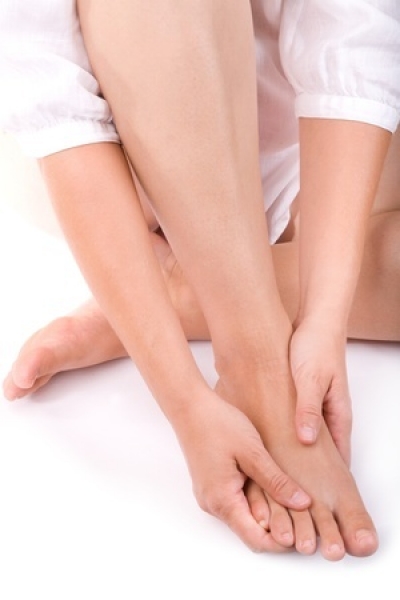Connect With Us
Blogs

Foot Care (19)
Each June we recognize Men’s Health Month and at Superior Foot & Ankle Care Center we think it’s a great opportunity to share with our Los Angeles County patients some tips for improving foot health for men.
One of the biggest differences in the way men and women approach health care, in general, is that women tend to be more proactive in taking care of health issues. Studies show that men are more likely to put off seeing a doctor until a problem is really bad. When it comes to your feet (and the rest of your body), detecting disorders in their earliest stages leads to quicker and more successful outcomes.
Here are some suggestions for keeping men’s feet healthier:
- Commit to basic foot care. No, it doesn’t have to be complicated or time-consuming. It can be as simple as washing your feet daily with soap and water and always starting the day with clean socks and a dusting of foot powder to help keep feet dry. This will reduce the risk of fungal infections.
- Give your feet the once over weekly. Looking at your feet can help you spot changes that may indicate a developing problem. Did you know that your feet can help detect health concerns like high blood pressure and diabetes? Swelling, hair loss on your toes or feet, and discoloration of the skin are a few of the indicators that something bigger may be going on in your body. If you see anything unusual, contact our Long Beach office at (562) 420-9800 office promptly for an appointment so that our podiatrists, Dr. Victoria M. Foley and Dr. Constance Ornelas, can examine your feet and determine if there’s an issue.
- Buy good shoes. One of the biggest ways to keep your feet healthy is to wear good-quality shoes that fit properly. Get rid of shoes with worn-down soles, stretched-out heels, holes, or other signs of wear. Avoid shoes that are too tight in the toe box to help prevent ingrown toenails. Always wear athletic shoes designed for the sport or fitness activity you are doing.
- Protect feet on the job. If you are a construction worker or deal with harmful chemicals or toxic materials always wear protective footwear.
- Live a healthy lifestyle. Maintaining a healthy weight, eating a nutritious diet, regular exercise, and getting enough sleep will all benefit your feet as well as the rest of your body.
If you have specific questions about a foot issue, don’t hesitate to contact us.
January is a time for making a fresh start and resolving to make positive changes. At Superior Foot & Ankle Care, we’d like to encourage our Los Angeles County patients to take some steps to ensure healthier feet and ankles in 2021. Below are some easy tips to implement:
- Commit to a Basic Hygiene Regimen—Did you know that simply washing your feet daily with soap and water and drying them thoroughly can significantly reduce your risk of fungal infections? If you add a dusting of a foot or fungal powder in the morning and a rich moisturizer at night before bed, you’ve got a fast and effective foot care plan.
- Check Your Feet for Changes—It’s easy enough while you’re cleaning your feet to look them over for any symptoms that may signal a developing problem. Check for toes that appear to be moving out of place, bruises, swelling, wounds that are slow to heal, discoloration of skin or nails, and any growths or lumps. If you notice something concerning, contact our Long Beach office by calling: (562) 420-9800 to make an appointment with our podiatrists, Victoria M. Foley and Dr. Constance Ornelas, to examine your feet and diagnose any problems.
- Keep Up with Nail Care—Trim toenails regularly and file any rough edges to prevent them from getting caught and tearing. Always cut nails straight across and be careful not to make them too short or they will be in danger of becoming ingrown.
- Choose Shoes Wisely—One of the single biggest steps you can take to prevent many common foot disorders is wearing good shoes. Look for styles that are made of soft, flexible material and have roomy toe boxes. Good arch support and a cushioned insole are also important. Limit time spent in high heels as these can harm your feet and cause bunions, hammertoes, and other deformities.
- Make Healthy Lifestyle Choices—Regular exercise, a healthy diet, and getting enough sleep all impact the condition of your feet as well as the rest of your body. Don’t try to change everything at once. Small changes that you can sustain will have big payoffs in the New Year!
If you have questions about the care of your feet, don’t hesitate to contact us.
Although the radio may be proclaiming “It’s the Most Wonderful Time of the Year,” we at Superior Foot & Ankle Care Center know that the feet of our Los Angeles County patients may not agree. It’s a time of year with lots of extra errands to run, cooking and shopping to do, and being on your feet for longer periods than usual. However, you can sail through the season feeling “merry and bright” if you follow the do’s and don’ts below to keep your feet and ankles healthy and pain-free.
Do: go easy on holiday feasting. Yes, there will be lots of delicious sweets and treats on the menu, but come January extra weight gain could result in added stress and pain for your feet. Many common conditions such as plantar fasciitis, sesamoiditis, and metatarsalgia are all aggravated by carrying additional pounds. If you suffer with diabetes or gout, you need to pay particular attention to what you put on your plate. Go for small quantities of your favorites to savor and compensate by not loading up on unnecessary carbohydrates. Avoid going back for seconds!
Don’t: allow your feet to stay in damp socks. Whether you’ve stepped in a puddle or your feet are sweating during a long day of shopping, it’s essential to not let feet stay where it’s moist. Damp, dark, closed-in spaces (like the insides of your shoes) are the perfect breeding ground for fungal infections. Pack an extra pair of socks and change into them when you notice feet feel sweaty. Use foot powder before you put on socks.
Do: carefully consider footwear choices. When you know you’re going to be on your feet for several hours or doing an above-average amount of walking, make sure the styles you choose are comfortable and have good arch support and non-stick treads. Limit the amount of time in high-heeled party shoes!
Do: leave extra time in your schedule for making appointments. Rushing is when you’re most likely to not see an object in your path which can cause an ankle sprain or other injury.
Don’t: put off getting foot pain evaluated by our podiatrists, Dr. Victoria M. Foley and Dr. Constance Ornelas. This can result in a podiatric problem getting worse and potentially requiring longer and more invasive treatments. Make an appointment at our Long Beach office by calling: (562) 420-9800 today.
Do you have an occupation that requires you to be on your feet for long hours at a time? At Superior Foot & Ankle Care Center we find that nurses, teachers, construction workers and other patients with jobs that have them upright and mobile for most of the day are more likely to have foot pain and swelling and are also at a higher risk for developing podiatric disorders. Although we can’t change your job, we can offer suggestions for ways to minimize foot pain and increase your comfort level.
Get Problems Checked Out Promptly
- The majority of foot problems, such as plantar fasciitis, sesamoiditis, flat feet and metatarsalgia, are made worse by being on your feet for extended periods of time. For this reason, if your work requires this, it’s particularly important to not put off getting foot problems evaluated. Our podiatrists, Dr. Victoria Foley and Dr. Constance Ornelas will examine your feet to determine the cause of your symptoms and recommend the best treatment. The foot doctor may be able to suggest padding or an orthotic device for your shoes to help relieve foot pain. Be sure to let the podiatrist know that you have a job that requires you to spend long hours on your feet.
Choose Shoes Wisely
- Your shoe choice is critical for comfort and protection. Choose styles with good ankle and arch support and a cushioned insole. It’s a good idea to alternate your shoes as well for maximum comfort and to avoid excess pressure to one particular spot on your foot.
Stay Hydrated
- Although it may seem backwards, drinking plenty of water is one of the best ways to prevent painful edema or swelling of your feet and ankles.
Make the Most of Break Time
- When you do get a break, get off your feet for as long as you can and elevate them if possible. Do some stretching exercises and flex your feet and toes. Once your break is over, try to change your position frequently. If you are unable to sit down, at least shift your weight from foot to foot.
Compensate During Non-Work Hours
- Be sure to put your feet up when you get home from work. Choose exercise and fitness activities that don’t put additional strain on your feet. Swimming, biking and rowing are examples of physical activities that don’t put more pressure on your feet. Be sure to soak your feet if they are sore and treat yourself to a foot massage now and then to relieve pain and stiff muscles.
If you have additional concerns about your feet and your occupation, contact our Long Beach office by calling: (562) 420-9800.
At Superior Foot & Ankle Care Center we want all of our patients to make the most of their time in our Long Beach office. Our goal is to promptly diagnose your foot or ankle pain and devise a personalized treatment plan. Use the questions below to prepare for your appointment and ensure that our podiatrists, Dr. Victoria Foley, and Dr. Constance Ornelas have all the information they need to help you.
Where does it hurt? Knowing specifically the part or parts of your foot that are in pain will be the first step in determining your podiatric problem. It will also be helpful for the foot doctor to know if the pain is constant or intermittent and if it is sharp, stabbing, dull or burning.
When is the pain worse/better? Does exercise make the discomfort worse? If so, do bring the shoes that you normally work out in to your appointment. Do you notice that the pain is worst when you first wake up in the morning? What happens if you rest the affected foot?
What’s the history? If you’ve had a previous foot or ankle problem that you think is related to your current complaint be sure to bring any medical records, x-rays or test results to your appointment. The foot doctor will also want to get a complete medical history—many disorders can be hereditary.
Do you have questions? If there are concerns you have about your symptoms or questions about treatment options that you want answered, be sure to write them down and bring the list with you to your visit to be sure you don’t forget anything. You may also want to bring a family member or friend to the appointment to be sure you hear and understand all the information the podiatrist gives you.
A little prep work before your appointment will help the podiatrist get to the root of your foot or ankle problem more quickly. Don’t hesitate to contact us at (562) 420-9800.
Fall sports practices are in the works and for children and teens that have spent the summer on the couch with a phone or video controller glued to their hands, it can be a shock to their feet to begin a strenuous sports routine. Below are 5 ways we at Superior Foot & Ankle Care Center recommend to ease the transition and protect young feet:
- Start working out. Have your child contact their coach for some suggested pre-season warm-ups. Stress fractures, Achilles tendonitis and other overuse injuries are common when patients overdo physical activity after being a couch potato for a couple of months.
- Find active ways to enjoy family fun. There’s still time for family bike rides, hikes, rollerblading and other physical activities. Not only will this help everyone get in better shape, it’s a great way to enjoy some time together before the hectic fall schedules kick in.
- Read up on a favorite athlete. Who is your child’s sports idol? Encourage them to look up interviews and information about how he or she trains during the offseason. It may give your child the incentive and inspiration necessary to get started.
- Buy new shoes. If your child is starting a sport it’s a good idea to get athletic shoes designed to support their feet for the activity they will be doing. Go to a professional fitness shoe store to get fitted and learn about the best options for your child’s foot. If your child is returning to a sport, check to see that their shoes fit and that there is no evidence of excessive wear. Worn soles, stretched out heel counters and creased uppers are all signs that it’s time to replace the shoes. Wearing shoes that are stretched out or falling apart invites injuries.
- Get a podiatric checkup. This is particularly important if your child has had an ankle sprain, fracture or other sports injury in the past. Our podiatrists, Dr. Victoria Foley and Dr. Constance Omelas will examine your child’s foot to ensure that the injury is completely healed. To make an appointment at our Long Beach office, call: (562) 420-9800.
At Superior Foot & Ankle Care Center we believe in being proactive when it comes to the health of your feet. In honor of Foot Health Awareness Month, we’d like to offer the following tips for taking care of your feet:
- Wear shoes that fit. This is one of, if not the single biggest steps you can take to prevent foot and ankle injuries and disorders. Some studies have shown that up to 90% of people are wearing shoes that are the wrong size! Shoes that are too narrow or tight in the toe box can encourage deformities such as bunions and hammertoes as well as increase the risk of ingrown toenails and fungal infections. Get your foot professionally measured at the shoe store. Shoe size can change as you age and during pregnancy.
- Get in the habit of doing self-exams on your feet. Changes in the skin or nails of your feet, as well as shape, size or color, can all be indicators of potential foot problems. Any differences in sensation (burning, numbness, tingling), swelling or abnormal growths should be reported to our podiatrists, Dr. Victoria Foley and Dr. Constance Omelas promptly. Early detection of a foot problem can mean a better outcome and less invasive treatment.
- Limit time going barefoot. Bare feet in public places are at a higher risk for coming in direct contact with fungi and bacteria that cause infections such as athlete’s foot and fungal toenails. Even at home, however, going barefoot increases your risk of puncture wounds and injuries.
- Don’t neglect foot hygiene. Basic daily care of your feet should include washing with soap and water (and drying completely) as well as applying foot powder or moisturizing lotion, depending on your individual needs. Don’t wear socks more than one day and alternate our shoe choice as well.
- Live a Healthy Lifestyle. You may not think about it but maintaining a healthy weight, exercising and getting regular checkups all contribute to the health and well being of your feet. Be sure that you monitor chronic diseases such as diabetes and arthritis and follow your physicians’ instructions for keeping this conditions under control.
If you have questions about how to best care for your feet, contact our Long Beach office by calling: (562) 420-9800.
Did you know that August 17th is National I Love My Feet Day? At Superior Foot & Ankle Center we can think of no better way to tell your feet you care then by buying shoes that fit properly and are good for your feet. Many common foot problems can be avoided by wearing the correct shoes for your feet. Here are some tips on shoe shopping:
- Buy shoes based on quality of construction and materials that are designed for the health of your feet not on fads and appearance.
- Be sure any shoes you choose take current foot problems you have into consideration. At your next checkup with our podiatrists, Dr. Victoria Foley and Dr. Constance Omelas, ask if there are special features you should look for or avoid when buying shoes. In many cases, such as with bunions, hammertoes, flat feet or high arches, the foot doctor can make recommendations about shoe design that will decrease discomfort and help prevent a foot condition from getting worse. In some cases, a custom orthotic device may help shift pressure away from an area that hurts. If the podiatrist prescribes an orthotic be sure to bring it with you to try on with the shoes you are considering buying.
- Get your feet professionally measured. Feet can change size as you age. It’s not uncommon to find that one of your feet is larger than the other. You should always buy shoes to fit the bigger foot. Also, don’t assume once you know your size that you all brands will fit the same. Always try on shoes before purchasing.
- Heel heights of 1 inch or less are best. The higher the heel, the more pressure that is exerted on the forefoot. Avoid pointy shoes and those with narrow toe boxes.
- Shop for shoes at the end of the day. That’s when your feet are their largest and most swollen.
- Run your hand around the inside of both shoes to be sure there is no loose stitching or rough spots that might rub on your skin.
- Don’t rush! Try on both shoes and take some time to walk around the store to make sure that shoes fit well and are comfortable from the moment you leave the store.
If you have questions about other foot health care issues contact our Long Beach office by calling: 562-420-9800.
August is Psoriasis Awareness Month and at Superior Foot & Ankle Care Center we want to offer our patients some information about this disease and how it affects your feet. Psoriasis is a chronic autoimmune condition that affects approximately 7.5 million Americans. In patients with psoriasis, skin cells are produced at an overabundant rate and cause red, scaly, itchy patches to form on the skin. There are two forms of psoriasis that most commonly affect your feet. One type causes the skin on your feet to become dry and scaly, the other, more severe, can also include pustules (blisters).
Triggers and Treatment
It’s important any time you see changes in the skin on your feet that you have one of our podiatrists, Dr. Victoria Foley and Dr. Constance Ornelas examine you. Psoriasis symptoms can mimic athlete’s foot and other conditions. If the foot doctor believes you have psoriasis, there are topical ointments and steroids that can be used on your feet to treat the condition. The foot doctor will also want to refer you to a doctor who specializes in psoriasis as this is a systemic disease that will require additional medical management.
While it’s estimated that 10% of the population are genetically predisposed to psoriasis, only 2-3% of those actually get the disease. Researchers believe that there are specific triggers that can cause psoriasis to flare up. Some steps you can take to avoid these include:
- Not smoking
- Limiting alcohol intake
- Consulting with your doctor about other medications you are taking (some given for high blood pressure, heart disease and depression may be triggers)
- Find ways to manage and reduce stress
- Wear comfortable shoes with adequate padding on the soles
- Protect your feet from injury and infection
Psoriasis is not contagious. If affects men and women at equal rates and most often develops between the ages of 15-35. If you are experiencing any unusual skin changes or symptoms, contact our Long Beach, CA office for an appointment today by calling: 562-420-9800. Most foot conditions will get worse, not better, if left untreated.
When’s the last time that you took a good look at your feet? At Superior Foot & Ankle Care Center, we believe regularly examining your feet is a key component of good foot health. In addition, your feet are the part of your body where several systemic conditions such as diabetes, arthritis and peripheral neuropathy may first exhibit symptoms. You can examine your feet in as little as 10 minutes. Ready, set, go:
- Start by standing with your feet together and look down at them. Do you notice any difference between your two feet in size or shape? Is there any swelling in your ankles or feet?
- Now sit down so you can get a closer look at each foot. Examine the top, bottom and sides of your feet as well as between your toes. If you see any cuts or wounds make sure they are clean and appear to be healing. Check your skin. Do you notice any redness, dry flaky skin, rashes or bruises? Do you have any unusual freckles or moles that appear to have changed since the last time you looked at them? Do you see any lumps, growths, warts or new calluses?
- Examine your toenails. Nails that are discolored, thick or crumbling at the edge may indicate a fungal condition. A bluish or purplish tinge to the skin under your nails is a possible sign of a circulation issue.
- While you’re seated, take a pencil and run the erased end over the top, bottom and sides of your foot. The sensation should be equal in all parts of your foot.
- Lastly, flex your toes and feet. Do you notice any pain or stiffness in your joints?
If you spot anything that doesn’t seem quite right, contact our Long Beach office for an appointment by calling: (562-420-9800). Our podiatrists, Dr. Victoria Foley and Dr. Constance Omelas, will give your feet a complete examination and assess whether you have a foot health issue.
Making this quick foot self-check a part of your monthly health routine will go a long way to preventing foot problems as well as detecting any conditions that do develop in their very earliest stages when treatment is usually less invasive and more effective.
More...
Here are some facts about lawn mower safety that may surprise you: lawn mowers produce three times the kinetic energy of a .357 handgun, with blades that spin at 3,000 revolutions per minute. It’s no wonder that more than 37,000 Americans are the victim of a power mower accident every year. Many of these are foot and toe injuries. At Superior Foot & Ankle Care Center, we want to help our patients keep their feet safe and prevent mower injuries. Below are our top tips:
- Wear the right shoes. Sneakers and sandals will not protect your feet if they come in contact with a mower blade. Work boots or another heavy shoe are the right choice. And, although it seems obvious, mowing barefoot is not a good idea (and yet each year there are patients in the emergency room with injuries because of this!)
- Never mow your lawn right after it rains. Even if it is inconvenient, don’t take a chance of your mowing slipping and losing control of it on slippery, wet grass.
- Keep children away. The two age groups most likely to suffer power mower accidents are children under the age of 14 and adults over 44. No matter how much they beg, do not let children ride in your lap while you are mowing. Also, be sure your children know not to approach you while the mower is running. The noise of the machine makes it difficult to detect that children are nearby.
- Treat any and all injuries immediately. Of course, in case of a major injury you will go to the emergency room. Even more minor injuries, however, such as a cut or a twisted ankle getting on or off the mower needs prompt treatment. If you have injured yourself mowing in a non-emergent way, call our Long Beach office to make an appointment at: (562) 420-9800. Our podiatrists, Victoria M. Foley or Dr. Constance Ornelas will conduct a complete examine of your feet and determine the best course of treatment for your injury. Remember that lawn mower blades are dirty, which creates a higher risk of an infection developing in a cut from a mower blade. Look for signs of infection: pus, redness or warmth around the injured area and fever. Report these to us immediately.
Before May comes to an end we at Superior Foot & Ankle Care Center want to pass on information about a disease that can have a serious impact on your feet (and the rest of your body): osteoporosis. Many people don’t give osteoporosis much thought until after they discover they have it—and that often only occurs when they actually break a bone. However, The National Osteoporosis Foundation reports that approximately 10 million Americans currently have this disease and that another 44 million are at risk of breaking a bone because of low bone density. To help raise awareness about osteoporosis and help patients decrease their risk of fractures here are some myths and facts about the disease:
MYTH: Osteoporosis is primarily a problem for women.
FACT: While it’s true that more women than men are affected by the disease—it’s estimated that one in two women will break a bone from osteoporosis—it’s a concern for men as well. Studies show that one in four men over the age of 50 will also break a bone from osteoporosis.
MYTH: I don’t like milk so there is no way for me to increase my bone strength through diet.
FACT: While dairy products such as milk, yogurt and cheese are heavy hitters when it comes to calcium, there are other foods that contain high amounts as well. Certain greens, such as spinach, kale, okra and collards, soybeans, and some fish like perch, sardines, salmon and rainbow trout are all also good sources of calcium. Many cereals and juices are fortified with both calcium and vitamin D, which helps your body better absorb the calcium.
MYTH: Other than increasing your calcium intake there is really nothing you can do to increase bone strength.
FACT: There are several ways to help make bones stronger. Exercise—both weight-bearing and muscle-strengthening—helps build bone. Smart life style choices, such as not smoking, limiting alcoholic beverages and maintaining a healthy body weight can all reduce the stress placed on your bones.
MYTH: Foot health is not directly impacted by osteoporosis.
FACT: Did you know that there are 52 bones in a pair of feet—that’s nearly a quarter of all the bones in your body. Having weak bones increases your risk of both stress and regular fractures from daily activities like walking up stairs or gardening. Osteoporosis also means that falls, missteps and ankle sprains are more likely to result in fractures too.
The health of your bones is very much a concern of our podiatrists, Dr. Victoria Foley and Dr. Constance Omelas. Be sure to discuss your personal risk factors with them at your next appointment at our Long Beach office.
Would you believe that the National Safety Council reports that there is an average of 180,000 foot injuries on the job each year? At Superior Foot & Ankle Care Center we want our patients to be proactive about the health of their feet at all times. Most patients spend a large percentage of their waking hours at work yet don’t give much thought to the health and safety of their feet in the workplace setting. Preventive health care for your feet at work falls into two categories: injury and overuse.
Injury
Injury to your feet on the job can come about as a result of the materials you are working with or the site of your work. Construction workers and those who work at sites where there is much debris and loose rock or other material on the ground need properly fitting shoes or work boots to support feet and ankles and minimize the risk of falls and ankle sprains. Another statistic from the National Safety Council showed that of the workers who suffered a job-related foot injury only about 25% were wearing protective footwear. Work boots with hard toe boxes protect against tools and heavy items being dropped on them. If you work with hazardous materials, chemicals or liquids at high temperatures you will want to take the proper precautions to protect your feet as well as the rest of your body.
If you wear work boots every day you may find it beneficial to have a second pair to trade off with to prevent repetitive stress to the same areas of your feet and to minimize the risk of athlete’s foot and other fungal infections that can breed in dark, sweaty boots. A day to air out between airings can reduce this risk significantly.
Overuse
The second source of workplace stress on the feet is overuse. Jobs that require long hours of standing or a significant amount of bending or climbing put stress on your feet. Be sure to take breaks throughout the day and elevate your feet (if you can’t do at work be sure to do when you get home) to reduce swelling. Many conditions are caused or made worse by standing for long periods of time. You will want to take the time to have the shoes you wear for work professionally fitted and be sure they are of high quality and provide good arch support and cushioning where needed.
Our podiatrists, Dr. Victoria Foley and Dr. Constance Omelas can make specific recommendations for appropriate footwear for you based on your foot condition and the work you do. Don’t hesitate to contact us for a consultation with the podiatrist at our Long Beach office by calling: (562) 420-9800. After a hard day’s work, your feet will thank you!
If you have smelly feet, you know it’s not a joking matter. At Superior Foot & Ankle Care Center we know that foot odor is embarrassing and it can also be a sign of a medical condition. People with sweaty feet often have a foot odor problem. It’s not the sweat, however, that smells bad, it’s when the sweat mixes with bacteria present in your socks and shoes that the foul smell occurs. Here are some ways that you can try to eliminate foul foot odor:
- Practice good podiatric hygiene. This means washing feet daily with warm water and a mild soap. (Be sure to dry completely, especially between your toes to prevent athlete’s foot from developing.) If you tend to sweat excessively, applying a talcum or anti-fungal foot powder may also be helpful.
- Wear cotton socks or those made of a natural material that wicks the sweat away from your skin rather than traps it. Ditto for your shoe choices. Plastic shoes and nylon socks do not encourage air circulation which is essential for preventing stinky feet.
- Change socks daily and more than once a day if your feet get wet or become sweaty.
- Don’t wear the same shoes two days in a row. Allow at least 24 hours for shoes to air out between wearings.
- Do not share socks, flip flops, pedicure tools, wash cloths or anything else that touches someone else’s feet directly—this is how bacterial and fungal infections are spread.
If these steps fail to get rid of foot odor, make an appointment at our Long Beach office. Our podiatrists, Dr. Victoria Foley and Dr. Constance Omelas will examine your feet and look into your medical history. Once the source of the foot odor is determined the foot doctor will prescribe the correct treatment to eliminate it and get your feet smelling sweet again.














